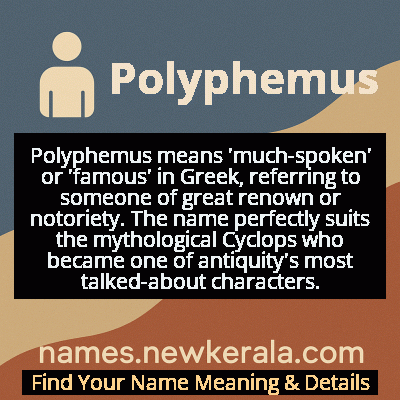Polyphemus Name Meaning & Details
Origin, Popularity, Numerology Analysis & Name Meaning of Polyphemus
Discover the origin, meaning, and cultural significance of the name POLYPHEMUS. Delve into its historical roots and explore the lasting impact it has had on communities and traditions.
Name
Polyphemus
Gender
Male
Origin
Greek
Lucky Number
6
Meaning of the Name - Polyphemus
Polyphemus means 'much-spoken' or 'famous' in Greek, referring to someone of great renown or notoriety. The name perfectly suits the mythological Cyclops who became one of antiquity's most talked-about characters.
Polyphemus - Complete Numerology Analysis
Your Numerology Number
Based on Pythagorean Numerology System
Ruling Planet
Venus
Positive Nature
Harmonious, responsible, caring, and artistic.
Negative Traits
Overly idealistic, superficial, possessive, or jealous.
Lucky Colours
Pink, turquoise.
Lucky Days
Friday.
Lucky Stones
Diamond, turquoise.
Harmony Numbers
2, 3, 9.
Best Suited Professions
Artists, musicians, teachers, healthcare workers.
What People Like About You
Warmth, nurturing nature, artistic flair.
Famous People Named Polyphemus
Polyphemus (Mythological)
Cyclops
Primary antagonist in Homer's Odyssey who imprisoned Odysseus and his men
Polyphemus (Galatea myth)
Cyclops shepherd
Central figure in the love story with the sea nymph Galatea, inspiring numerous artistic works
Polyphemus (Argonautica)
Hero
Participant in Jason's quest for the Golden Fleece, son of Eilatus
Name Variations & International Equivalents
Click on blue names to explore their detailed meanings. Gray names with will be available soon.
Cultural & Historical Significance
Extended Personality Analysis
The personality associated with Polyphemus is characterized by a dramatic duality between brutish primitivism and unexpected emotional depth. His Homeric portrayal emphasizes raw, untamed qualities: immense physical power, territorial instinct, and a complete disregard for civilized norms including the sacred Greek laws of hospitality. He represents the ultimate outsider - living in isolation, governed by appetite rather than reason, and possessing a terrifying single-mindedness symbolized by his single eye. Yet the later tradition reveals surprising complexity: his love for Galatea shows capacity for tender emotion, artistic expression (he sings and plays music), and profound vulnerability. This creates a psychological portrait of a being torn between his monstrous nature and human-like sensibilities, making him one of mythology's most compelling studies in contradiction. His rage when rejected and his pathetic attempts at courtship reveal the pain of unrequited love, transforming him from pure monster to tragic figure.
Modern Usage & Popularity
In contemporary naming practices, Polyphemus remains exceptionally rare and is almost never used for actual children due to its strong associations with monstrosity and cannibalism. Its modern usage is primarily confined to literary and academic contexts, appearing most frequently as a character name in fantasy literature, video games, and mythological retellings. The name enjoys some currency in scientific nomenclature, particularly in biology where several species bear the name, most notably the Polyphemus moth known for its distinctive eyespots. Among Greek communities, it might occasionally be used as a traditional mythological reference, but generally parents prefer less problematic mythological names. The name's usage trends show it maintaining a consistent but extremely low frequency, primarily serving as a cultural and literary reference point rather than a practical given name.
Symbolic & Spiritual Meanings
Symbolically, Polyphemus represents multiple profound concepts that have resonated across Western culture. His single eye serves as a powerful metaphor for limited perspective and the dangers of seeing the world through a singular lens without nuance or alternative viewpoints. He embodies the eternal conflict between civilization and barbarism, intelligence and brute force, order and chaos. As the son of Poseidon, he also symbolizes the untamable power of nature and the sea. His transformation across literary traditions from monster to lovesick poet makes him a symbol of redemption and the universal human capacity for emotional vulnerability. The cave he inhabits represents both physical isolation and the subconscious mind, while his blinding by Odysseus symbolizes the triumph of cunning over raw power. Ultimately, Polyphemus stands as a complex symbol of otherness, reminding us that even the most monstrous appearances can conceal unexpected depths of emotion and humanity.

